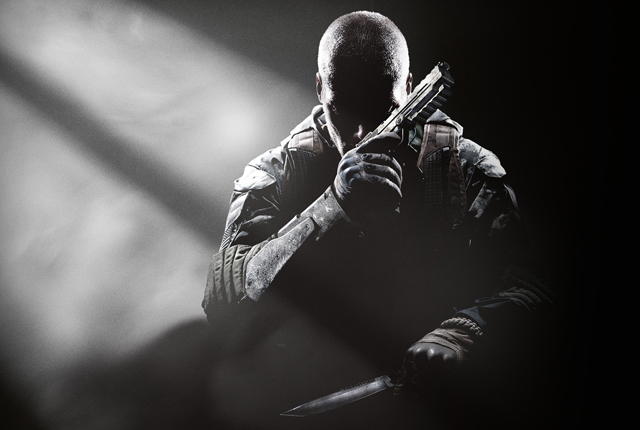 The video game industry has a number of mega-franchises — Warcraft, Halo, The Elder Scrolls — but none of these command the same level of attention (or profit) as Activision Blizzard’s first-person shooter blockbuster, Call of Duty. The most recent outing from this military series, Call of Duty: Black Ops II, debuted again to a star-laden commercial blitz and a midnight launch.
The video game industry has a number of mega-franchises — Warcraft, Halo, The Elder Scrolls — but none of these command the same level of attention (or profit) as Activision Blizzard’s first-person shooter blockbuster, Call of Duty. The most recent outing from this military series, Call of Duty: Black Ops II, debuted again to a star-laden commercial blitz and a midnight launch.
But can Black Ops II sustain Call of Duty’s amazing momentum? We turn to industry analyst Michael Pachter of Wedbush Securities and Soraya Murray of the University of California at Santa Cruz to provide additional perspective on the success of this latest Call of Duty game.
 Call of Duty: Black Ops II — The critic’s review
Call of Duty: Black Ops II — The critic’s review
- By Dean Takahashi, GamesBeat staff writer
My arms feel like they’re permanently vibrating from all of the machine-gunning I’ve been doing lately. I’ve played just about every aspect of Call of Duty: Black Ops II, and I have the sore wrists to prove it. As the holidays approach, Activision Blizzard is launching its ninth installment in the Call of Duty military combat series, and this one is as violent, action-packed, and as full of adrenaline as ever before.
So much for peace on Earth.
Each year, Activision generates more than a billion dollars in sales from Call of Duty games. In order to hold the title of the fastest-selling game in history, the developers at Activision’s Treyarch studio have to keep trigger-happy gamers feeling like the game has something new to offer. On this front, Treyarch has delivered. Call of Duty: Black Ops II is loaded with so much content that its $60 price seems like a bargain, and everyone else in the industry is going to have to meet a high bar if they want to hang on to the attention of gamers as well as this title does.
This game has so many elements that it is four games in one. It includes the single-player story campaign with 11 missions. On top of that, it has five single-player Strike Force missions, the Zombies cooperative play game, and multiplayer gaming with 16 maps and several new modes at the outset. The single-player campaign may keep you busy for eight hours or so (I played it on the Hardened difficulty (which is one notch above Normal), and it kept me busy for about 12 hours), but the whole package is meant to keep you occupied with Call of Duty so that it becomes a round-the-clock, year-round part of your life.
Read the full GamesBeat review
Final critic’s score: 89/100
Call of Duty: Black Ops II — The analyst’s review
- By Michael Pachter, managing director, Wedbush Securities
- Twitter: @michaelpachter
Call of Duty: Black Ops II is another gravity-defying offering from Activision. When the 2009 installment in the series, Modern Warfare 2, sold 16 million units, many (including me) doubted that any other versions of the game could achieve that level of sales. Instead, Black Ops sold a staggering 25 million units in 2010, setting the bar for future versions ridiculously high. Last year’s Modern Warfare 3 sold “only” 23 million units, and the skeptics returned, questioning whether Black Ops II could come close to that figure. It appears that this year’s version has a sufficiently high Metacritic rating (86), solid marketing support, and very good early numbers ($500 million in first-day sales) to once again exceed the 20 million unit sales level. Of course, naysayers may consider that a failure, but I think Black Ops II developer Treyarch should be commended for creating a series that will likely sell 45 million units in just two years.
When thinking about why the Call of Duty series has been so immensely successful, one need look no further than the large (and apparently growing) Call of Duty multiplayer community. According to Activision, as of June, the various Call of Duty multiplayer offerings had more than 25 million monthly active unique online players. I have heard anecdotal evidence that more than 50 percent of Call of Duty players never even bother with the single-player campaign, launching into multiplayer right out of the box. From the reviews I’ve seen, Black Ops II multiplayer is once again outstanding, and the community of online players will find itself once again compelled to purchase this year’s game.
While early returns may appear underwhelming, insofar as they are likely down slightly year-over-year, it is important to keep in mind that Black Ops II faces a lower level of competition, with last year’s solid Battlefield 3 effort replaced by this year’s Medal of Honor Warfighter disaster. It is highly likely that competition from Battlefield attracted wallet share, especially from gift givers, and we are confident that few gamers’ holiday wish list contains Medal of Honor. Thus, although Black Ops II may be off to a slightly slower start than last year’s Modern Warfare 3, I’m pretty confident that the game will catch up in sales by year-end.
Final analyst’s score: 95/100
Call of Duty: Black Ops II — The academic’s review
- By Soraya Murray, Ph.D, assistant professor, University of California at Santa Cruz
- Twitter: @sorayamurray
Call of Duty: Black Ops II possesses all of the storytelling elements of great theater or film: a tragic intertwining of a brother and sister’s fates, an almost Shakespearean relationship between father and son, brotherhood in arms inadvertently betrayed, and scenes of action, gore and all-around emotional gut-punching. The word “interactive” is a bit passé at this point, but it really does feel like interactive cinema, with gameplay driving the player toward the next tantalizing plot point. I remember sitting on a game panel with Jordan Mechner, creator of the Prince of Persia franchise, and he described one of the core qualities of the cinematic experience being as follows: No matter what happens on screen, you are powerless as a viewer to affect any outcomes. One watches helplessly, and that is an inflexible dimension of the form. That means, depending upon the buy-in from the viewer, the maker of the film can potentially ratchet up emotions and angst to almost unbearable places.
I’ve seen a few games that can generate this kind of investment, even though the player can interact with onscreen action through gameplay. Spec Ops: The Line, with it’s “War is hell,” Apocalypse Now-brooding meditation was one. Black Ops II excels in this regard. If there is some kind of benchmark for a game that is the most film-like, this would be it. This is due in some part to the liberal application of references to blockbuster films (Mission Impossible 4, Battle: Los Angeles, Reign of Fire, Black Hawk Down, or any supersoldier film). Its first-person shooter perspective contributes to this investment, too. At times, it is frustrating what limitation this imposes. For example, the worlds of the past (1980s) and future (2025) are rich, textured, full of spectacular sound and image — and yet one is bound to always stay on track and complete the missions. So, one fights through history and the future, seemingly to change the outcome, but the very form of the game itself precludes any real possibility of more than four outcomes, and hence any real exploration. Ultimately, one is trapped in the labyrinth of progress, from that which has been to that which will inevitably be, in a kind of tunnel vision of objectives. To be forced to experience it in that way doesn’t do justice to the game’s brilliant sense of place.
And speaking of past and future, this is a key theme of Black Ops II. Namely: What in our past makes us (both as individuals and the human race) who we are, what propels us toward our fates, and what assures the future. Let me tell you: If it were up to this game, it is not looking good, with it’s futuristic Cold War crisis, cyber-warfare, scenes of torture, drone attacks, and maniacal philosopher terrorists. Case in point: Raul Menendez, argued by many reviewers to be the most developed, pathos-inducing genius mad-dog villains in video game history, wants to bring the whole global economic system down. He mutters anti-capitalist phrases like “Opulence is sinful, and we all pay for it.” Overlaid onto this is an interspersing of actual history with the fictional narratives of the game — including major historical figures, one of which (Oliver North) actually voices his own character for the game. What does this mean about the flexibility of these stories we tell ourselves about the past, the present, and what is possible for the future? Let’s hope our future outcomes aren’t quite so hopelessly delimited by our past.
Final academic’s score: 90/100
VentureBeat's mission is to be a digital town square for technical decision-makers to gain knowledge about transformative enterprise technology and transact. Learn More


